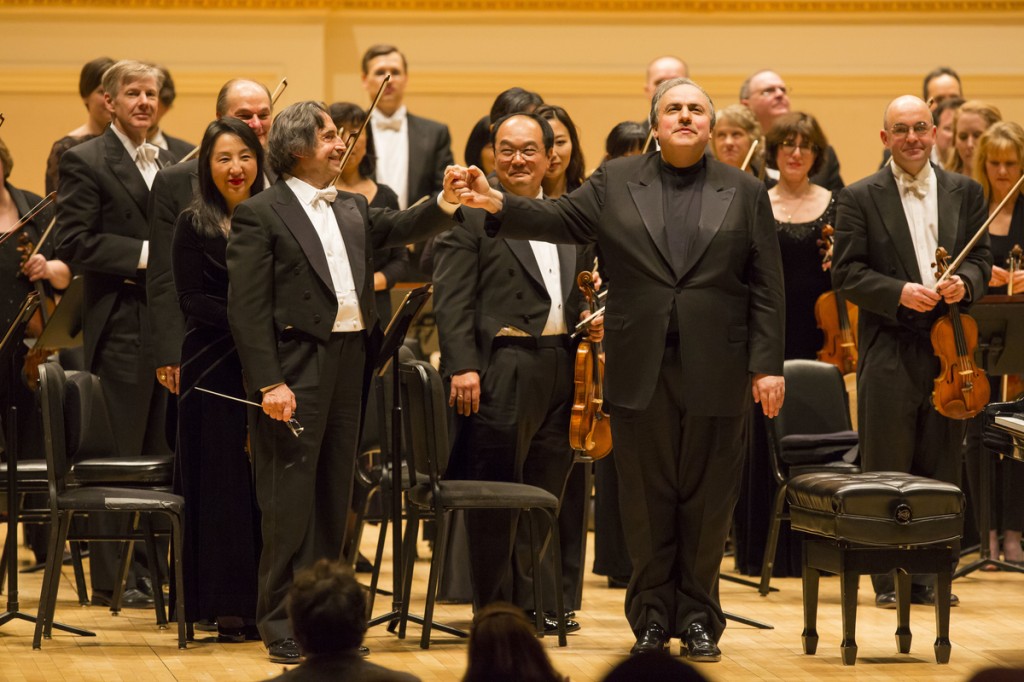Bronfman’s Brahms provides the highlight in mixed night for Muti, CSO

Yefim Bronfman takes a bow after his performance of Brahms’ Piano Concerto No. 2 with Riccardo Muti and the Chicago Symphony Orchestra Saturday night at Carnegie Hall. Photo: Todd Rosenberg
The Chicago Symphony Orchestra under Riccardo Muti is almost the Platonic ideal of what a symphony orchestra should sound like. The strings have a seamless, beaming quality, the woodwinds a cool warble, the brass imposing weight. The horns, so often the perpetrators of cringing blats and sour notes in lesser ensembles, are absolutely flawless. The polished beauty of the CSO’s sound is just about unrivaled.
It also means, though, that there isn’t much about the sound that truly distinguishes this orchestra from others. Sure, the brass section is deservedly renowned, and Muti leans on them more heavily than most conductors. But listening to the CSO’s Brahms and Schumann on Saturday at Carnegie Hall, it sounded as though any top-rank orchestra and any conductor could have given the same performance.
Yefim Bronfman did manage to impart some individuality to Brahms’ Second Piano Concerto. One of the most reliably solid concert pianists around, he can be stolid at times, as well, but his formidable technique on Saturday was matched by musical energy.
The first movement (beginning with a gorgeous, distant call from those marvelous horns) showed Bronfman’s heroic side, his energetic sound filling the hall. His furious passion was counterbalanced by a floating, glowing sound, and his playing was crisp, even in the rolling passages.
This concerto is peculiar in that it has what essentially amounts to two first movements. In the Allegro appassionato that followed the Allegro non troppo, Bronfman was more moody, allowing notes to mingle and stew in the piano. Muti tried to push him now and again, but Bronfman kept the tempo back, allowing room for reflection.
Dulcet cello playing from John Sharp stood out in the Andante, his sighing phrasing and molasses tone sounding for all the world like an operatic tenor. Right from the spacious ascending chords at the first piano entrance, this Andante was a movement of gleaming beauty. The finale that followed was anticlimactic, in need of more bouncing energy.
But then, so was the symphony that made up the second half. Schumann’s popular “Rhenish” Symphony. No. 3, a bright, lively piece. Again, the CSO’s playing was beautiful on its surface, but it was one-dimensional. The Scherzo, in particular, was overly matter-of-fact, and Muti, despite his leisurely tempo, did not seem interested in stopping to smell the roses. The third movement was a particularly egregious example, dissolving into a sort of general bucolic pleasantness as the music proceeded methodically, without much relish.
The best of the symphony came in the fourth movement, where Muti’s deliberate pace allowed the music to develop slowly, a dull rumble always threatening below the surface. As elsewhere, sharp dynamic contrast defined his interpretation, but somehow it seemed here more powerful, better articulated.
The finale bears the same marking, “Lebhaft” (“Lively”), as the opening, and it exhibited the same lack. There was little sparkle to the music-making, and here was the only example of an error in balance, as the brass landed like a volley of artillery over the ginger traipsing of the strings. Even the thrilling coda failed to stir the spirit. Here’s hoping Alexander Nevsky is more fervid on Sunday–if that doesn’t wake up the players, nothing will.
The Chicago Symphony Orchestra closes its Carnegie Hall stand 2 p.m. Sunday, performing Scriabin’s Symphony No. 1 and Prokofiev’s Alexander Nevsky. carnegiehall.org







Posted Feb 01, 2015 at 5:15 pm by Dave
This orchestra has its own sound and style (and high standards), and if you listened to various orchestras perform the same work, the CSO would stand out. In its current profile, the combination of transparency, flexibility and power is perhaps unique in the world. Instrumental details and entire lines that sometimes become muddled in other performances are brought to life by this ensemble. The group accomplishes this because of incredible attention to detail, and if some people write the results off as too perfect or too “polished” then I think they don’t understand the commitment and dedication of the musicians.
Posted Feb 03, 2015 at 9:56 pm by Stephen Essrig
Well, De gustibis…but we couldn’t disagree more. Unfortunately, while Bronfman is always note perfect, there is often no real passion or excitement in his playing. More importantly, Muti has NEVER had an affinity for the classic big guns, and this was the case in the Brahms. Well played, but no real structure or sense of line. The next day we listened at home to the Bohm/Backhaus and of course it had all the passion and structure that the Muti/Bronfman lacked.
But we loved the Schumann and the Italianate singing lines, albeit with some German romanticism in the background is much more to Muti’s stylistic liking. Perhaps that’s all he is capable of-so be it, it was beautifully played.